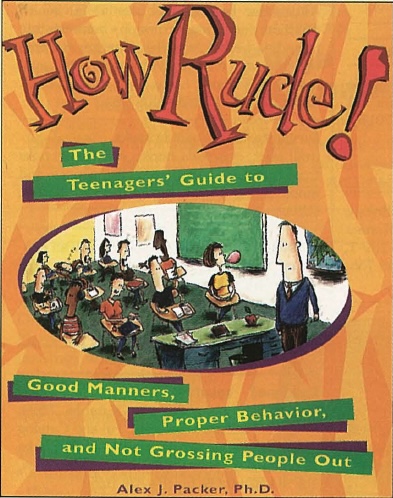Alex J. Packer opens his witty yet wise, irreverent and very relevant book, How Rude, The Teenagers’ Guide to Good Manners, Proper Behavior, and Not Grossing People Out, with historical tidbits on manners: “The evolution of table manners can be quite fascinating. For example, when forks were first used for eating in Tuscany in the 11th century, they were condemned by the clergy. This was because food was seen as a gift from God. Only the human hand, another of God’s creations, was fit to touch it (‘Ethelred, use your fingers, not your fork!’).”
In his humorously illustratedteen lingo, Packer lays out the table of manners. Drawing from his extensive surveys, he lists what adults and teens consider the 20 most important manners. Here are ten: 1. Say “Please,” “Thank you,” “You’re welcome,” “May I?” and “Excuse me.” 2. Write thank-you notes. 3. Look people in the eye. 4. Clean up after yourself. 5. Respect adults. 6. Don’t interrupt. Wait for your turn to speak. 7. Treat people as you would like to be treated. 8. Use good table manners (wait to begin; chew with your mouth closed; stay at the table until the last person is finished eating; etc.) 9. Give people a firm handshake. 10. Have compassion towards others.
Here is how Packer teaches teens to receive gifts (after he has instructed them in all the goofs and skills of gift giving): “There are two ways to receive a present: 1. with great pleasure, or 2. with greater pleasure. Response No. 1 is for gifts you don’t particularly like. It involves a warm smile, a look of delight and surprise, and expressions of gratitude such as: ‘Thank you so much.’ ‘I’m going to enjoy reading it.’ ‘This will look so nice in my room.’ ‘I’ll sure stay warm in these.’ For gifts you do like, use response #2. Wear an ear-to-ear grin. Let your jaw fall open and your eyes bug out. Remain speechless for a second or two as words fail you. Run around the room a few times. Do cartwheels. Say, ‘I can’t believe it’ and ‘Oh, wow!’ over and over while you try to regain control of your conscious mind. Then let loose a torrent of thanks: ‘This is so-o-o-o-o fabulous!’ ‘I’ve wanted one of these forever and ever!’ ‘This is the greatest present!’ You’ll notice that these responses do more than just convey gratitude. They make the person who gave you the present feel like giving you another one. This is a lovely by-product of the proper expression of thanks. Now that you know what to do, here’s what not to do: don’t ask how much something cost. This is always a serious breach of etiquette. Don’t complain about gifts you receive. As in: ‘Not another stupid wallet.’ ‘Nobody wears these.’ ‘Why’d you get me this?’ ‘I already have one.’ This may be difficult, particularly if you were expecting a car and ended up with an Etch-A-Sketch. But sometimes, for the sake of the greater good, you have to pretend.”
Packer, who styles himself as a polite educator, is also a psychologist and screenwriter. In a recurring motif of his book called Dear Alex, a teen asks, “How can you have manners without people thinking you’re weird?” Alex answers, “The only people who think manners are weird are those without any. Who cares what they think?”
To order How Rude, write to: Free Spirit Publishing, 400 First Avenue North, Suite 616, Minneapolis, Minnesota 55401-1730, USA, web: <a href=”http://www.freespirit.com>www.freespirit.com


